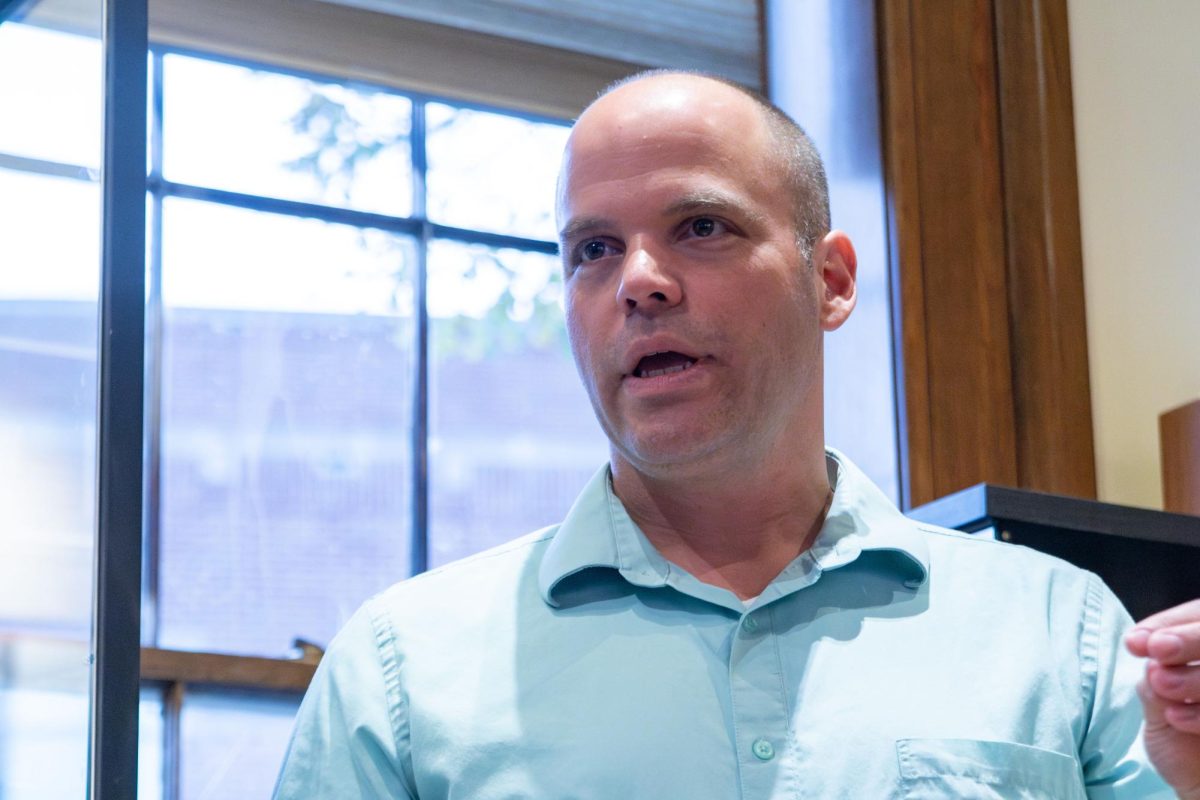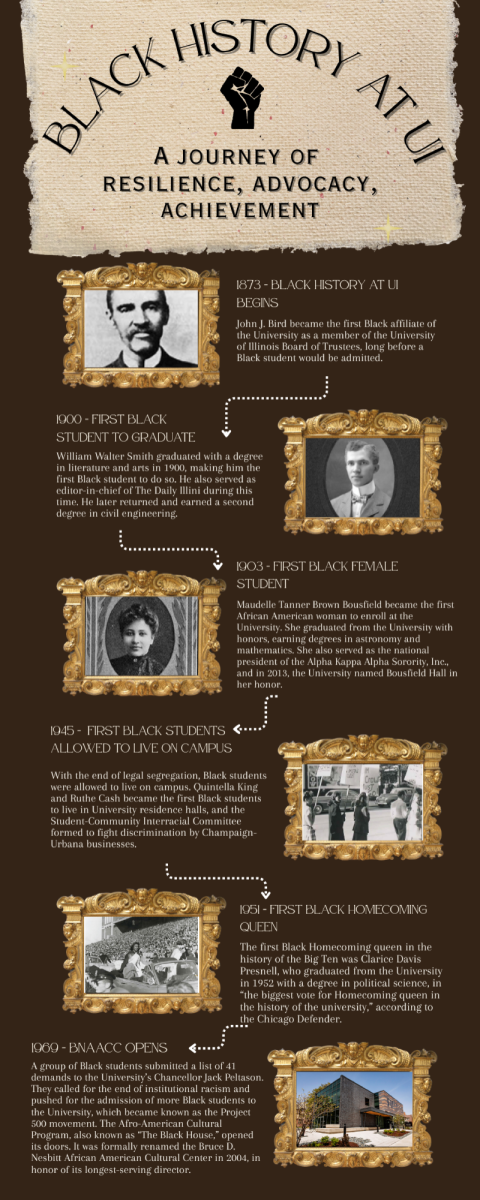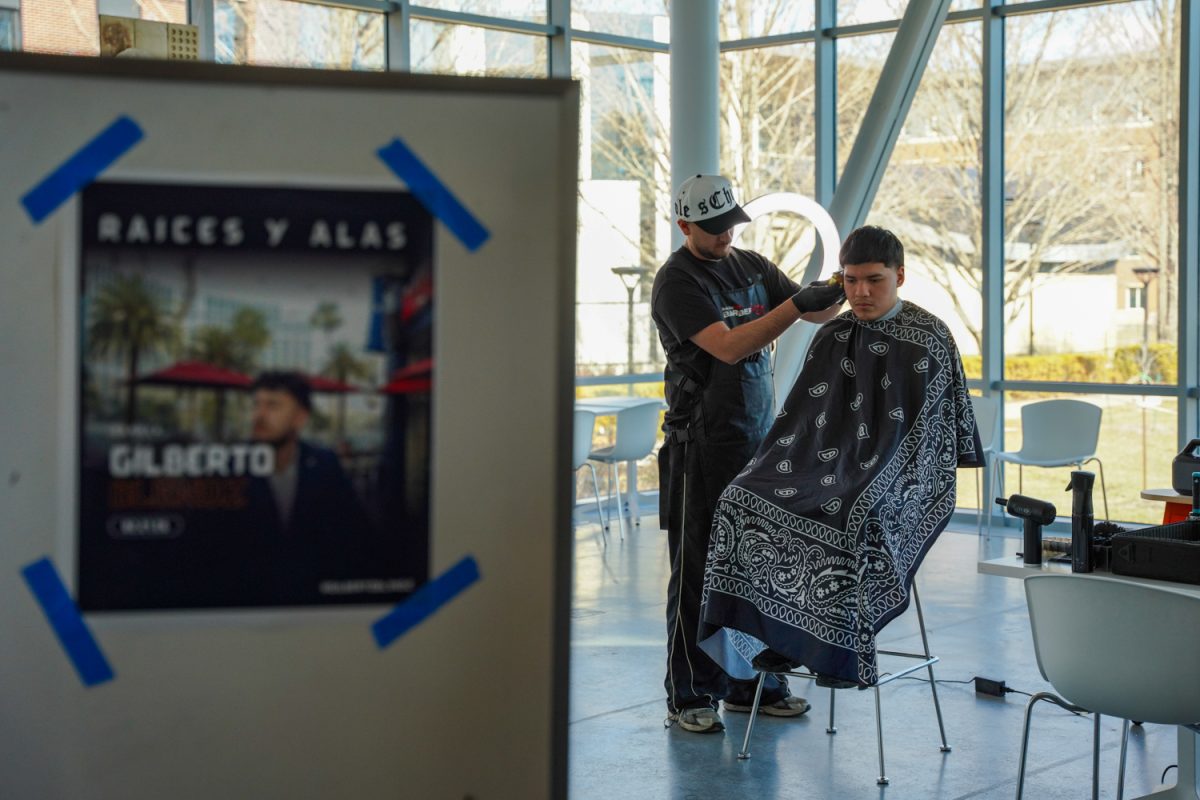Illini Hillel shared 100 years of its history in an exhibition showcasing its biggest points of pride at the Champaign County History Museum on Saturday.
Executive Director of Illini Hillel Erez Cohen and Museum Manager Will Best unveiled the display, revealing several historical artifacts representing the exhibition’s theme of pride.
“Hillel is the de facto Jewish cultural center on campus,” Cohen said. “Our mission statement is to enrich the lives of Jewish students so that they may enrich the lives of others in the world.”
The items on display included a dedicated plaque from Hillel’s original 1930s building, a dedication brick for the 2008 Cohen Center for Jewish Life and a golden plaque marking Hillel’s 90th anniversary. It also includes ritualistic items like a Kiddush cup, a blue Seder plate and a Chanukiah.
At the top of the display, there was a street sign that spelled out “Honorary Rabbi Ben Frankel Way,” which John Street was named after in 2018.
Get The Daily Illini in your inbox!
Umeeta Sadarangani, former professor at Parkland College, explained the significance and her appreciation for the museum’s Hillel exhibition.
“I’m glad this museum exists,” Sadarangani said. “I think it’s really important for us to know the history of where we live and the various moments that have changed our community.”
Hillel’s history began in the early 1920s when the University of Illinois welcomed 300 Jewish students on campus.
“We were actually founded at a time Jewish students didn’t have a lot of access to social outlets,” Cohen said. “Jews were excluded from many of the student organizations at the University of Illinois.”
In 1923, a key figure in Hillel’s history arrived in Champaign-Urbana: Rabbi Benjamin Frankel.
With a lack of Jewish organizations on campus at the time, professor Edward Chauncey Baldwin expressed his concerns to Frankel for the lack of spiritual guidance Jewish students had.
As a result, Frankel founded the first-ever Hillel at the University that same year. This led to more than 800 Hillels to form at many other universities.
“Rabbi Frankel said that Hillel is, by design, a home for every type of Jewish student, regardless of their background, regardless of their level of religiosity,” Cohen said.
Cohen said one of the artifacts in the Hillel exhibit that stood out to him was the Rabbi Frankel street sign.
“One that is very, very dear to my heart is one of the commemorative honorary street naming signs for Rabbi Ben Frankel,” Cohen said. “It’s dear to me because this was initiated during my time as executive director.”
Best explains the preparation and planning for Hillel’s exhibition first began with the museum’s former manager, Connor Munson.
Munson first contacted Cohen about coming to the museum to give a talk commemorating Hillel’s 100 years of history. On June 15, Cohen spoke in front of 150 people detailing the organization’s historical moments.
After the event, Best recognized the local community’s interest to continue exploring Hillel’s history within the museum.
“There was enough interest in the local community, as well as enough story present,” Best said. “Both I and our previous director and the board thought it was an important chance to shine a spotlight on the history of Hillel.”
Lindsay Andrews, chair of the museum’s education committee, began working on the Hillel exhibition to further push education incentives about Jewish history.
Hillel had given Andrews a document detailing their history, but she noticed it lacked an emotional touch.
“It was very timeline and you didn’t quite get that color, that warmth that you see when you speak with Erez about how proud he is about the institution,” Andrews said.
Andrews talked more with Erez about Hillel’s history, which sparked creativity and ideas for the display.
“I asked him to speak more about the things that he was proud of, like, he just lit up and it’s hard not to want to pursue those avenues,” Andrews said.
Andrew’s collaboration with Cohen inspired them to choose pride as the theme for the exhibition.
“We’re talking about pride because Hillel is and should be a source of pride for the local Jewish community that basically created Hillel,” Cohen said.
Over the years, Hillel’s Jewish community has increased and continues to serve its students on campus.
“We’re actually living in a pretty thriving community,” Cohen said. “Hillel is extremely active. We work with over 2,000 students per year. ”
Cohen explained Hillel has given Jewish students an opportunity to connect with their identity in different ways.
“This could be from a queer perspective, this could be from an engineering perspective, this could be from a religious perspective,” Cohen said. “We work with every Jewish student to find their niche and help them develop it.”
Cohen hopes the Hillel exhibit will connect with people on a personal level.
“I really want this to be an exhibit that feels like a look in the past,” Cohen said. “But also a look into our future as something promising and something that we can all hold dear to our hearts.”








